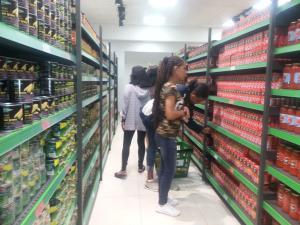A truck loaded with apples to be distributed to private businesses has been recently seized at the La Puntilla store in Miramar, Havana. As a consequence, disciplinary and precautionary measures were taken against the employees of the store. As if it still wasn’t enough, rationalization in the sale of 48 products was also announced.
The Diario de Cuba newspaper arrived at the site to gather facts and inform the public, but the employees refused to give any details.

The new manager of the store where the incident took place as well as the new shop assistants told the journalists that they had been forbidden to provide any information. Only a parking lot watchman, an eye witness, agreed to comment on the incident provided that his anonymity would be guaranteed.
“This store makes this type of wholesale purchases on a regular basis,” he said. “In Cuba, there is no wholesale trade, so business owners have to come to sites like La Puntilla if they want to buy in bulk. I can’t deny that there were many boxes (around 1,500, which corresponds to some 36 thousand apples), but what’s wrong with that? Business is business. What really happened there was that the journalist who reported the incident wasn’t able to buy apples, so he got upset and complained. If he had been able to buy what he wanted, he would have left with his shopping bag without paying attention to the truck. None of this would have happened.”
This watchman, who has been working for La Puntilla for 20 years, assured us that bulk purchases are nothing unusual there.
“Beer, for example, costs 1 CUC in La Puntilla, so owners of restaurants and private restaurants (known as paladares) buy them here in the store because they are able to sell them for 2 to 3 CUC. The same applies to the Cuban malt drink malta and other soft drinks, toilet paper and other products. Owners of private businesses are sometimes granted a license by the State, which obliges them to pay a fee along with other taxes. They strive to provide good services, so they come here and buy supplies for a month and sell them for a higher price to make a profit. However, the biggest profiteer is the State itself: sometimes it has warehouses full of products that are missing in the market and doesn’t distribute them, causing shortages, with which we are forced to constantly deal with.”
A truck driver working for the store, who also witnessed the incident, agreed with the watchman’s comments, adding the following:
“Now the store has a new manager and new shop assistants, a new storekeeper and a new director, but it’s of no help if the business conditions continue the same. Besides, who can control that? They would have to put a policeman at each cash register. The salaries of shop assistants are based on sales volume. If they sell a lot, they get a bit more money at the end of the month, is it clear?”
If you visit some private businesses close to La Puntilla, you can see that the owners have high solvency and offer a wide range of beverages and meals.
“Our business has not been affected at all, nothing has been rationed,” says Mario, owner of the Pepe’s restaurant on the crossing of streets 4 and Primera. “Life goes on as usual,” he says, dubiously.
The owner of another cafeteria, who also asked us to keep his identity confidential, revealed that had his own contacts and that nobody can prevent him from taking supplies from stores.
“For example, during the whole year I have a guaranteed supply of beer and canned soft drinks including malta, which are my core products. Even if there is a shortage at a certain time of the year, I’ve never run out of them. They may make these ridiculous efforts in La Puntilla and other large stores to control the amount one can buy, but the self-employed know other forms of marketing. It’s a system that has been created by the State itself and obviously, it’s very difficult to dismantle it now.”
The watchman at the La Puntilla parking lot told us that before the triumph of the Revolution, his parents owned a family-run cafeteria. They worked from dawn to dusk and despite not having to face any economic hardships, they were never able to get rich.
“In a few years you will see that many owners of restaurants and businesses will have become millionaires because they sell at high prices, doubling or tripling the price of the products. Who are these people? Do you know what you will find if you trace their origins? Nothing else than the State! The State is the main culprit.”

Leave a comment